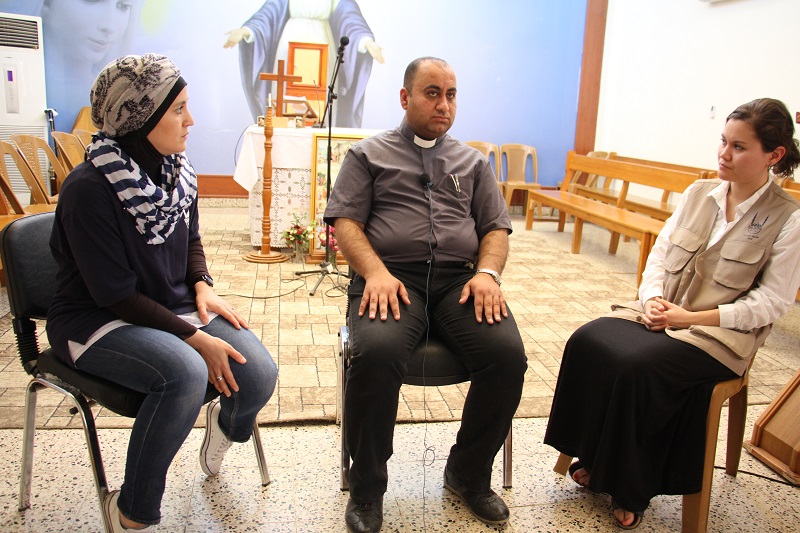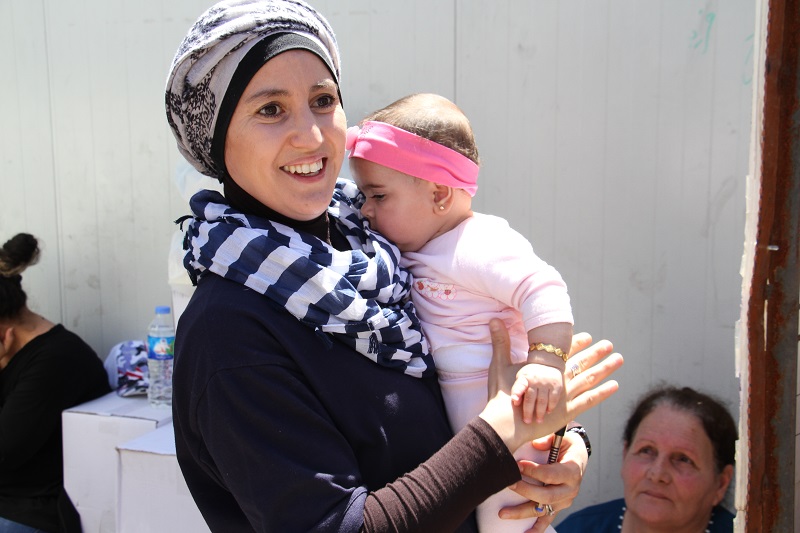Reflecting on her recent visit to Iraq, aid worker Najat El Hamri reports on the needs and hopes of those displaced by conflict – and what Islamic Relief is doing to help.
I returned to Iraq earlier this month. Since my last visit, the humanitarian situation has deteriorated further. Over 2.6 million people are now internally displaced, and the number of refugees from neighbouring Syria is approaching 250,000. Public services in areas such as Iraqi-Kurdistan – particularly in Erbil city, where Islamic Relief has an office – are straining to meet the huge and growing needs of the families that are seeking safety there.
Many have no work and no access to schools or healthcare. With nowhere else to shelter, some are living in tents, caravans, schools and even partially constructed buildings. Despite this, there was still hope in the eyes of the people I was privileged to meet.
Distributing aid at Mart Shmone Church
I travelled with Islamic Relief Iraq’s emergency team to Ainkawa town, an Erbil suburb where some Christians now live after being displaced from Mosul. Outside Mart Shmone Church, we were welcomed by the local priest as we began distributing food parcels and hygiene kits to 200 families.
As the families waited patiently to collect their packages, several shared their stories. Currently living in Ainkawa or other towns nearby, they told me of their longing for home and the stability they once had. Each of them never imagined that one day this could happen to them. Homes, farms and possessions have been left behind. Now, they have only memories left.

One woman recalled the marriage of her son. Just two weeks after the happy event, the whole family was forced to flee. Another explained how she misses the community gatherings at church: she used to go to her place of worship three times a day, and now she has very limited access.
A member of the Islamic Relief team found the distribution particularly tough. A Christian, she too had fled Mosul and met two of her relatives and her former teacher amongst the crowd waiting for aid. It was very hard to witness all they had lost, she said.
I asked why so many wore black clothing. A couple of people began to cry and I learned that this was mourning attire, as they grieved for friends and relatives that had lost their lives.
Dreaming of home and stability
While a few of those I met have managed to find temporary work since arriving in Ainkawa, many depend upon humanitarian assistance. For some, this is the second time they have been helped by Islamic Relief. But what they want more than anything is to return home and resume their lives.

The conflict has worsened the situation in Iraq, which has been gripped by crisis since the 80s. The spike in fighting, which began last year, has seen the number of people in need of humanitarian aid climb to a staggering 5.2 million – and there is still no end in sight.
People of all backgrounds are suffering, and Islamic Relief is doing all it can to help. We are reaching vulnerable families, including in hard to reach areas. Yet the challenges increase with each new wave of displacement. Swelling needs have led to gaps in vital areas such as water, sanitation and hygiene (WASH), health, education, resilience and emergency intervention.
You can help. Support our work by donating to our Iraq Emergency appeal now.










